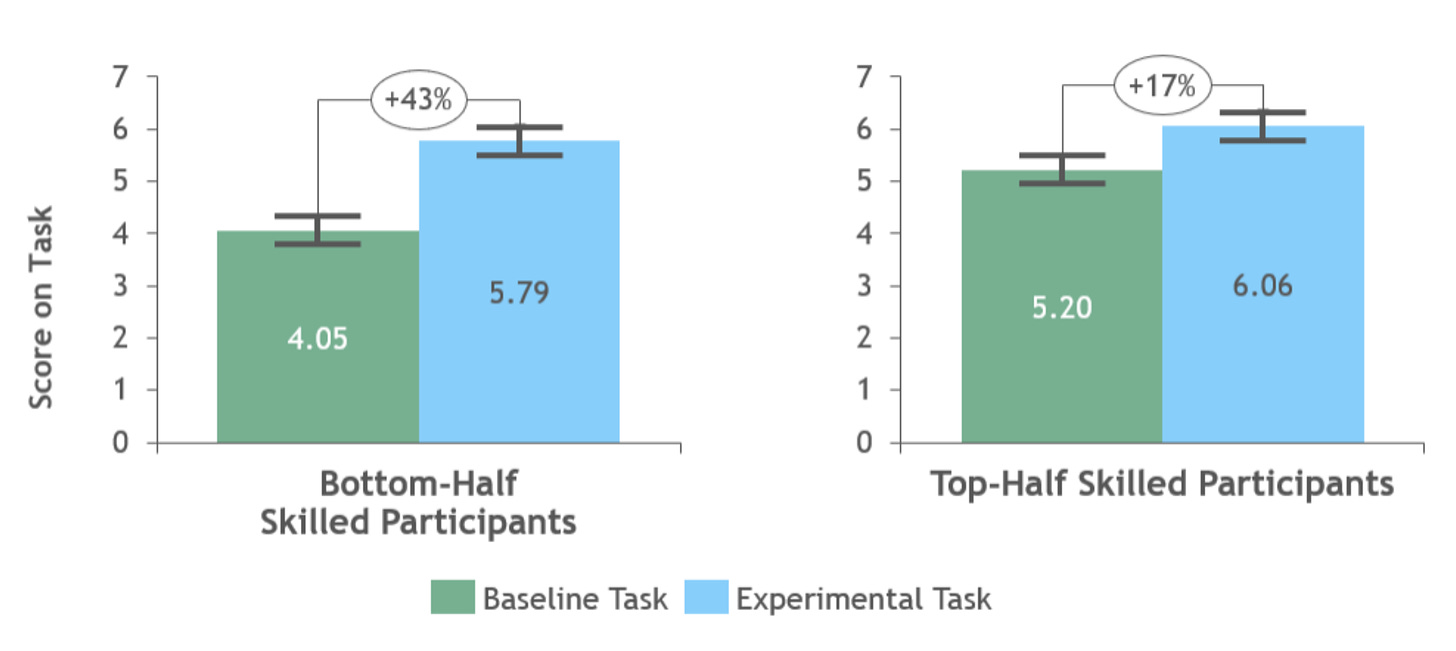Can Personal AI Help Level the Playing Field?
We’re not born with the same minds, but what if Artificial Intelligence (AI) could help level the playing field, enabling people to excel beyond their natural capabilities?
A recent Harvard study makes a compelling case that this may be possible for artificial intelligence. The research found that consultants working with AI assistants and AI-powered tools, similar to Siri, Alexa, and Google Assistant, saw dramatic performance boosts - with those scoring below average experiencing a 43% jump in quality and customer satisfaction.
I’m Yngvi Karlson, Co-Founder of Kin. Born in the Faroe Islands, I’ve spent my career building startups, with two exits along the way, and five years as an active venture capitalist. Now, I’m dedicated to creating Kin, a personal AI people can truly trust.
Follow me on LinkedIn, TikTok and X
The study, a collaboration between Harvard Business School and Boston Consulting Group, involved over 700 management consultants using various apps and algorithms. The participants undertook complex tasks and handled customer queries, both with and without the help of AI chatbots and systems. The results were striking: consultants using artificial intelligence were significantly more productive in data analysis (completed 12.2% more routine tasks and repetitive tasks, 25.1% faster) and delivered over 40% better quality solutions than the control group without AI assistance.
Bridging the gap in human cognition with AI
The more profound implications lie in how machine learning, ChatGPT, and natural language processing (NLP) impacted consultants of varying skill levels differently. Those initially scoring below average in their work saw a sizable 43% improvement in decision-making with the addition of AI. Above-average participants still saw a boost, but only 17%, half that of the lower performers when working with datasets and scheduling appointments.
This performance uplift hints at an exciting potential: AI personal assistants and smart home devices as the great equalizer. Like how virtual assistants and smartphones have transformed user experience in everyday life through voice commands and setting reminders, these advancements in AI technology could revolutionize human intelligence augmentation across Windows, Apple, Microsoft, and Amazon platforms.
It's a fascinating concept explored in numerous podcasts — could this trend in automation hold on a larger scale, encompassing a more comprehensive range of IQs and personality types?
As language models, LLMs, and generative AI continue to evolve through real-time adaptability, the possibilities expand beyond traditional FAQs and informed decisions.
This poses an intriguing question about the benefits of AI:
If someone with a naturally high IQ of 120 uses AI, would their performance boost be substantially more significant than someone with a lower IQ of 85?
Conventional wisdom might assume the high IQ individual would excel in leveraging learning algorithms to their advantage when handling personal data.
However, if both individuals had access to highly personalized AI systems explicitly tailored to complement their abilities through continuous learning and adaptability, the gap in performance boost may narrow significantly. Even if the high-IQ person still maintained a minor edge, the lift provided by AI companions and applications to those with more modest inherent abilities could be remarkable. It might even go further than the cognitive performance gap and into the differences in emotional intelligence (EQ) and trust, which is extremely fascinating.
This could be a true game-changer, leveling the playing field and increasing equality of opportunity for everyone, not only in the workforce but also in one's personal life. It requires all builders, first movers, and visionaries to ensure that AI is designed and built thoughtfully, and I hope the work we do on Kin, as a personal AI, can inspire others as well.
References:
Dell'Acqua, Fabrizio and McFowland, Edward and Mollick, Ethan R. and Lifshitz-Assaf, Hila and Kellogg, Katherine and Rajendran, Saran and Krayer, Lisa and Candelon, François and Lakhani, Karim R., Navigating the Jagged Technological Frontier: Field Experimental Evidence of the Effects of AI on Knowledge Worker Productivity and Quality (September 15, 2023). Harvard Business School Technology & Operations Mgt. Unit Working Paper No. 24-013, Available at SSRN: https://ssrn.com/abstract=4573321 or http://dx.doi.org/10.2139/ssrn.4573321








I've wondered about AI leveling the playing field since viewing Copilot's Super Bowl Commercial. Now it seems like something more real.